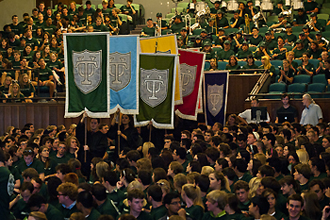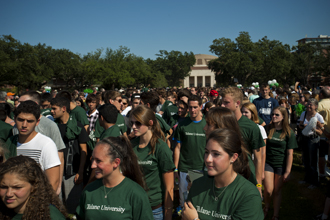Remarkable Class Joins New Orleans Renaissance
Tulane University welcomed more than 1,630 members of its newest entering class on Saturday (Aug. 27), a group described as “remarkable by any measure,” from their academic promise to their dedication to community involvement.
Read President Cowen's convocation speech |

With new first-year students filling McAlister Auditorium, a parade of gonfalons starts off the 2011 Convocation Ceremony on Saturday (Aug. 27). (Photos by Paula Burch-Celentano)
Hailing from 48 states and 20 countries, with average SAT scores above 2000, the newest Tulane students spent Saturday morning moving into residence halls with help from their families and friends. In the afternoon, the first-year students streamed into McAlister Auditorium for the 2011 Convocation Ceremony, donning green T-shirts proclaiming “Only at Tulane, Only in New Orleans.”

Students file out of McAlister, a sea of green in their “Only at Tulane, Only in New Orleans” T-shirts, heading to an outdoor reception with their parents and Tulane President Scott Cowen.
They were chosen from 38,000 applicants, said James MacLaren, dean of Newcomb-Tulane College.
“We expect much of you,” said MacLaren, whose college is the academic home for all full-time undergraduates. “And we're here to foster that success.”
Today (Aug. 29) marks not only the start of classes for undergrads, but also the sixth anniversary since Hurricane Katrina. In that fateful 2005 weekend before the start of scheduled classes, students arrived and were quickly dispatched away from New Orleans as the powerful storm approached.
This year, more than a few parents and students as well as Tulane President Scott Cowen were concerned about Hurricane Irene lashing the Eastern Seaboard on Saturday, while New Orleans enjoyed sunny skies and a merciful light breeze.
“I'm mindful of the East Coast as we sit here,” Cowen said in his convocation address, a reference undoubtedly appreciated by the significant number of students and their parents on campus from Northeastern states.
Post-Katrina New Orleans is “in the midst of a renaissance the likes of which this country has never seen,” Cowen said, telling the students, “Most people thought New Orleans and Tulane would never recover, and if they did, they would never regain their stature and reputation. You being in this audience bears witness to the fact that they were absolutely wrong.”
Today the city is a hotbed of innovation, he said, as well as an incubator for new ideas and new industry in areas of bioscience, filmmaking, video game design and green technology. Tulane, from its faculty to its students, has been instrumental in that transformation, “and it will continue because you are now here,” Cowen said.
